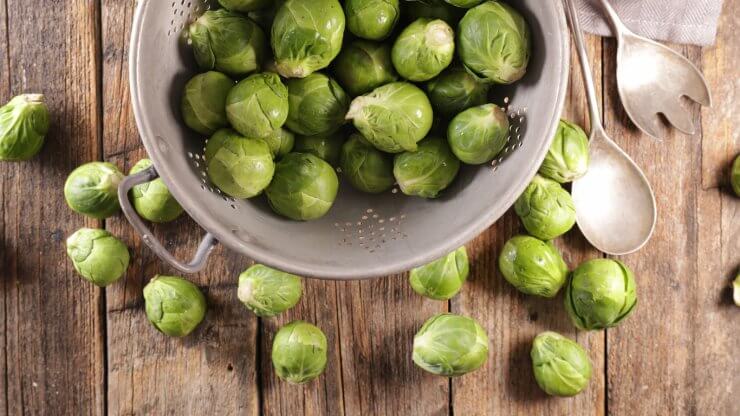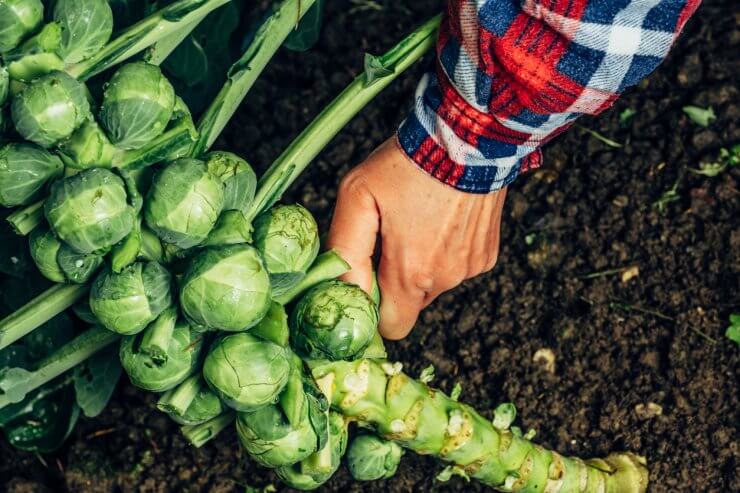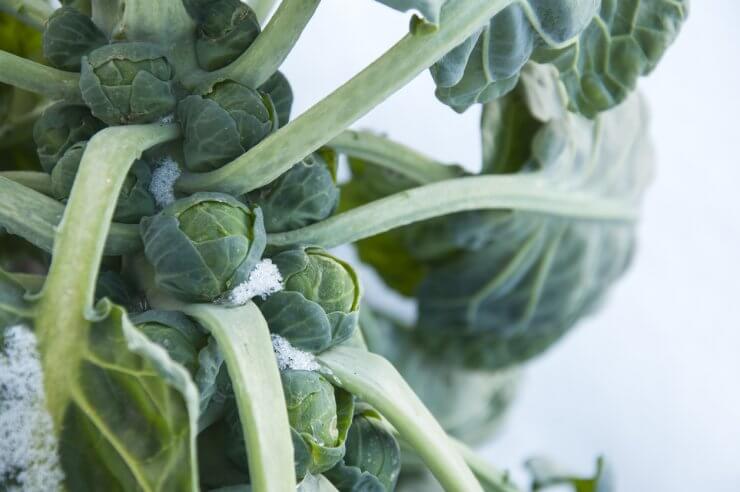
Brussels sprouts, freshly harvested
Ever since Dutch scientists started developing new hybrid varieties of Brussels sprouts, home gardeners have had a field day with all their choices! Where once there were just heirloom Brussels sprouts, full of glucosinolate (the compound responsible for Brussels sprouts’ bitterness), now there are more than a hundred varieties to choose from. Here’s a sampling:
- Tasty Nuggets
- Churchill
- Bubbles
- Oliver
- Groninger
- Falstaff
- Gustus
- Vancouver
- Dominator
- Mezzo Nano
- Franklin
Before you choose a variety to grow, you need to keep the Brussels sprout’s growing needs in mind. It’s not a difficult vegetable to grow, but it does have specific needs:
- Brussels sprouts are slow-growing, so you need to match your chosen variety to your growing season. Keep in mind that Brussels sprouts taste best when they’re harvested after a light frost. Check your gardening calendar and count backwards to find your ideal planting time.
- Brussels sprouts like cool weather the best, but they’ll start sprouting from seed in soil temperatures between 45 to 80 degrees F.
- Brussels sprouts like the cold; in fact, a little frost is a good thing. But you do want to make sure you harvest your plants (or dig them up and bring them inside—you can do that!) before a killing frost, since a killing frost will ruin your crop.
- Brussels sprouts are heavy feeders. They need nitrogen-rich soil in order to thrive. You’ll need to prepare your soil ahead of time and plan for a couple applications of fertilizer throughout the growing season.
- Brussels sprouts are not drought-tolerant, so you need to ensure they get adequate water as they’re growing—and you’ll need to protect them from excess heat; they do not like the heat. If you have a set of scorcher days coming, get some shade for your plants.
Once you get to harvest time, you have a broad set of choices for how to prepare your Brussels sprouts—from fresh slaws to steamed side dishes to roasted casseroles and more.

Brussels sprouts being harvested
Brussels sprout Harvesting Bonus Tips: Pick your Brussels sprouts from the bottom up, twisting the little sprouts off the stem. It’s a good idea to trim drooping and/or yellow leaves as you go along, so the plant can put its energy into producing sprouts.
If you top off your plant, that will discourage new leaf growth and will encourage the plant to put all of its energy into growing the sprouts still on the stalk. That can give you a stalk full of fully ripe Brussels sprouts, and you can cut the stalk off at the base and take the whole thing into the kitchen! Some cooks roast the Brussels sprouts right on the stalk; some use the stalk as a decorative centerpiece before twisting the sprouts off and cooking them. The leaves are edible, too, so don’t just toss the top of your plant when you bring in the Brussels sprouts!

Brussels sprouts producing in winter
Some Brussels sprouts plants will continue growing and producing well into the winter months, as long as there’s no hard freeze. If you take a little extra care to shelter your plants from cold snaps, you can eat fresh sprouts for months!
Do you grow different varieties of Brussels sprouts? Which ones do you grow? Please tell us how you use your Brussels sprout harvest—and what you do with all the excess Brussels sprouts. Do you make sauce or can them? Or do you give them away to family, friends, and neighbors to enjoy?


 Previous
Previous

